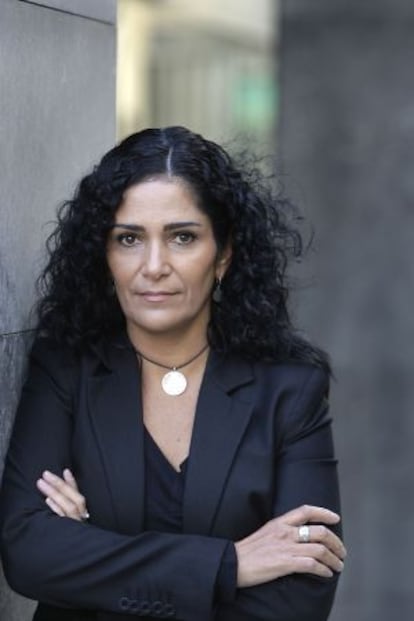"The government recommended that I leave the country"
The World Press Freedom Hero has received death threats over her reporting


The Italian writer Roberto Saviano has called her "a role model for anyone who wants to become a journalist." The author of Gomorrah wrote this in the foreword to Slaves of Power: A Journey to the Heart of World Sex Trafficking of Women and Girls, the book that Lydia Cacho believes is responsible for her having to go into hiding outside her native Mexico. After publishing the book, Cacho received a death threat she took very seriously.
"There are people who think that this threat thing is getting tedious. I, too, am really tired of having to draw attention to death threats against me, but I also believe that it is precisely the fact that I don't keep quiet about it, that I investigate who issued the threat and name names while providing evidence... This attitude is one of the reasons why I am still alive," Cacho told EL PAÍS in a telephone interview.
At 49, Cacho has earned multiple international awards for her reporting on violence against women and children, and in 2010 the International Press Institute named her a World Press Freedom Hero. She has received numerous threats, and was once assaulted and raped in an apparent retaliation for her investigative work.
On August 3 it emerged that Cacho, who has been living in Cancún (state of Quintana Roo) for the last 20 years, had left Mexico. More than the threat itself ("It always inspires awe when you pick up the phone and hear that you're going to be returned to your family in pieces"), what scared Cacho was the fact that her security had been violated.
"For years now, for security reasons, I have a satellite radio that is practically impossible to crack unless you have very sophisticated equipment, the kind of equipment that is only in the hands of high-ranking officials in the Mexican Navy and the cartels. I don't have any problems with the Navy, so we're left with one of the cartels," she explains.
After getting the threat, the journalist called her lawyers and several foreign advisers specializing in rescuing kidnapped people (she would not name them). "In a couple of hours they told me I had to get out of there. On other occasions they have given me different instructions, but this time they said, 'Take your passport and leave immediately, because not just anyone can do this, and they must have done it not five kilometers from your home.'"
Now, the woman who has offered support to thousands of women since 2000 through her secret shelter for abused women and their children, called Integral de Atención, has been forced to leave the country over what she feels is her reporting on Mexican pedophilia rings and international gangs trafficking in women.
"When I was in Veracruz chatting with Regina Martínez [who was assassinated on April 28], she told me that 'the people who threaten you do not murder you, when they're going to kill you they just do it, period - nobody warns you.' Perhaps this used to be the case, but in the last few years we journalists have learned that organized crime and corrupt individuals in positions of power whom our work has put in the spotlight are turning threats into part of their ceremonies of power. First come the threats, and later the deaths. I am very clear about that and I am not ready to join the death figures. I would rather be on the list of persecuted women, not the dead ones."
Tu suscripción se está usando en otro dispositivo
¿Quieres añadir otro usuario a tu suscripción?
Si continúas leyendo en este dispositivo, no se podrá leer en el otro.
FlechaTu suscripción se está usando en otro dispositivo y solo puedes acceder a EL PAÍS desde un dispositivo a la vez.
Si quieres compartir tu cuenta, cambia tu suscripción a la modalidad Premium, así podrás añadir otro usuario. Cada uno accederá con su propia cuenta de email, lo que os permitirá personalizar vuestra experiencia en EL PAÍS.
¿Tienes una suscripción de empresa? Accede aquí para contratar más cuentas.
En el caso de no saber quién está usando tu cuenta, te recomendamos cambiar tu contraseña aquí.
Si decides continuar compartiendo tu cuenta, este mensaje se mostrará en tu dispositivo y en el de la otra persona que está usando tu cuenta de forma indefinida, afectando a tu experiencia de lectura. Puedes consultar aquí los términos y condiciones de la suscripción digital.








































